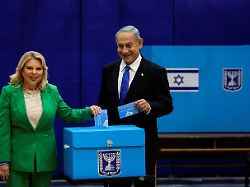There is a slight majority
Netanyahu camp leads Israeli election
11/01/2022, 21:06
According to forecasts, the right-wing conservative Likud party of opposition leader Netanyahu will be the strongest force in Israel’s parliamentary elections. This could mean that the former prime minister is about to make a comeback. The anti-Netanyahu camp behind Prime Minister Lapid is losing out.
After more than a year of opposition, Benjamin Netanyahu could face a return to the post of prime minister, according to forecasts in Israel. In the fifth parliamentary election within three and a half years, the right-wing religious camp around the 73-year-old achieved a narrow majority of 61 to 62 out of 120 seats. His right-wing conservative Likud party was the strongest with 30 to 31 seats. According to the forecasts, Prime Minister Jair Lapid’s Future Party comes right behind them with 22 to 24 seats. Previous elections have shown that the picture can still shift before all votes have been counted. The final result is not expected before Thursday.
For the first time in Israel’s history, an extreme right-wing alliance made third place. According to the forecasts, the Religious Zionist Party of Bezalel Smotrich and Itamar Ben-Gvir will have 14 to 15 seats and is considered a possible kingmaker for Netanyahu. An extraordinarily high turnout was evident in the election until the evening. According to the Central Election Committee, the turnout of the 6.8 million eligible voters by 7:00 p.m. (CET) was 66.3 percent – the highest level since 1999. Two major camps – Yes-Bibi vs. No-Bibi
For Netanyahu, nicknamed “Bibi,” it was a fateful choice both politically and personally: A right-wing religious government could help him to escape the ongoing corruption process by changing the law. The 73-year-old had mediated the alliance between Smotrich and Ben-Gvir in a targeted manner and thus helped the right-wing extremists to rise.
When voting on Tuesday, Ben-Gvir reiterated his intention to become Minister of Internal Security. The 46-year-old lawyer has been convicted of racist hate speech in the past and advocates, among other things, the deportation of Arabs “who are against the State of Israel”. He has also repeatedly been accused of deliberately fueling the conflict with the Palestinians. Most recently, he drew a gun himself during confrontations in East Jerusalem.
Forming a government could take time
According to forecasts, the anti-Bibi camp around Lapid won 54 to 55 seats. It includes parties from the right to the left spectrum – what unites them above all is the will to prevent Netanyahu from returning. However, Lapid seems unlikely to forge a coalition like they did last year. For the first time, an Arab party was also represented in his government. The Arab minority makes up about 20 percent of Israel’s approximately 9.4 million citizens. Before the election, she was credited with having a major impact on the final result. The 58-year-old Lapid recently spoke out clearly for the establishment of an independent Palestinian state. According to the forecasts, at least two of the three Arab parties cracked the 3.25 percent hurdle.
After the election, President Izchak Herzog decides who will be given the task of forming a government. The candidate then has four weeks to form a coalition. Like last year’s election, it could be weeks or months before a government is in place. As long as Lapid stays in office. If the formation of a government fails, another new election could be held next year.
The party landscape in Israel is highly fragmented and driven by interests. Even parties from similar camps are often not able to form alliances. In addition to differences in content, this is also due to personal disputes. For example, Netanyahu’s relationship with other main figures of the right-wing camp is considered extremely bad.
Lapid and Netanyahu mobilize voters
The two main political rivals – Lapid and Netanyahu – were still fighting for every vote on the day of the election. When he voted, Bibi was still “a little worried” about whether he would make a comeback. His opponent Lapid also called for voting before he voted. He had previously visited the grave of his father, Josef (Tommy) Lapid, a Holocaust survivor who became known as a journalist and politician.
Israel has been in a permanent crisis since 2019. The past elections had often led to unclear majorities. The current eight-party coalition led by Prime Minister Naftali Bennett collapsed in June after losing its majority after just 12 months. Foreign Minister Lapid then took over the post of head of government.
